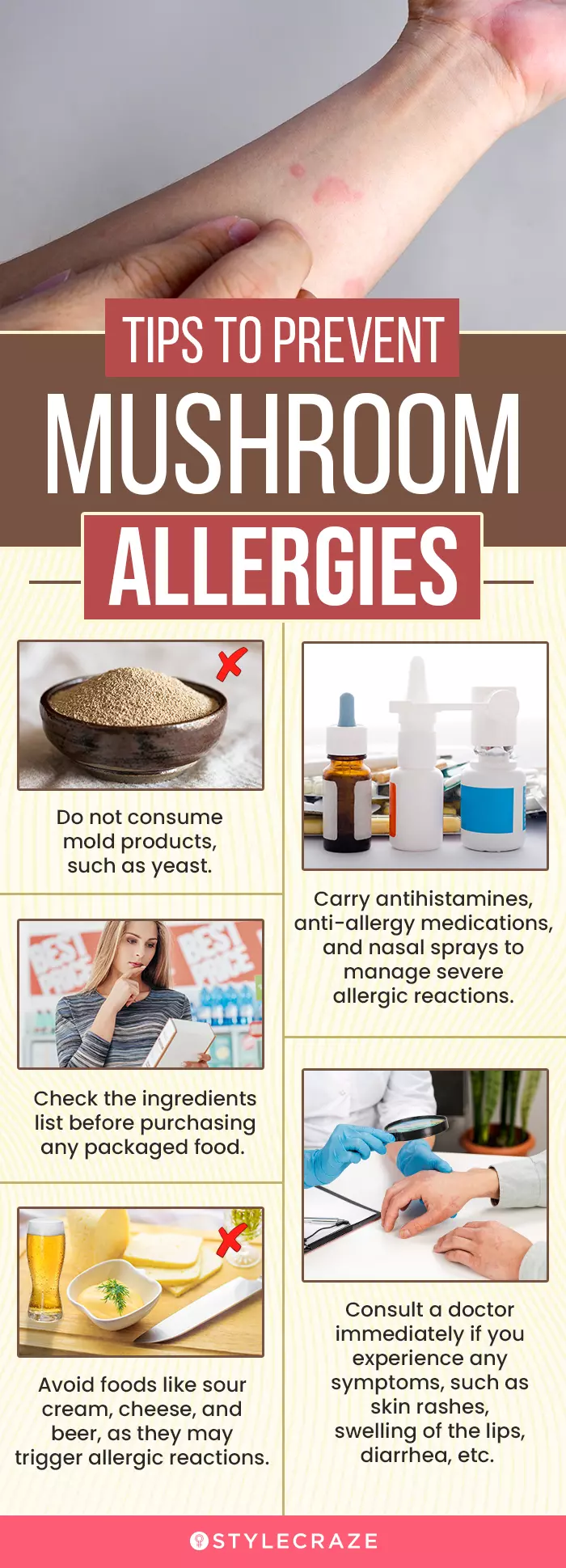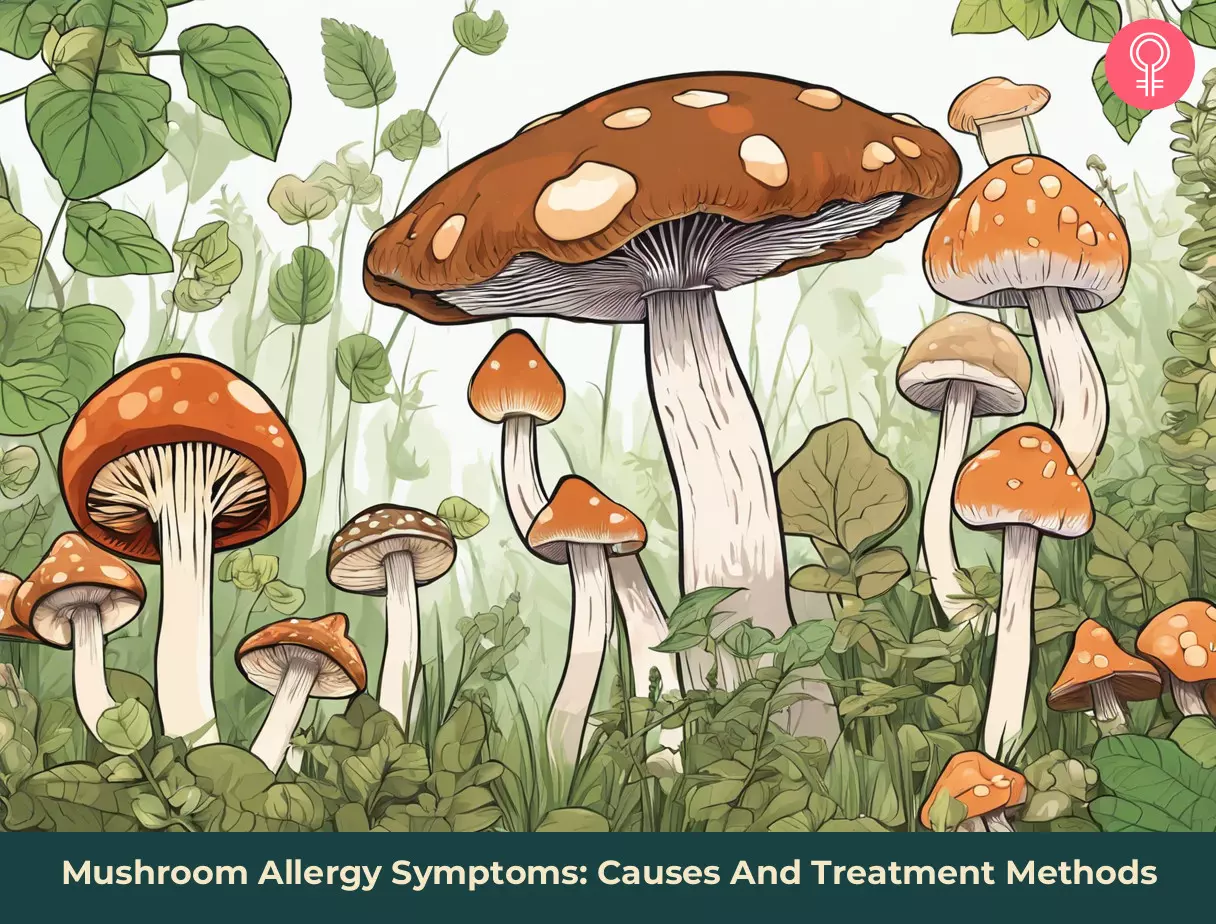What Is Mushroom Allergy?
A mushroom allergy can be either due to eating mushrooms or inhaling their spores (2). They are usually classified into three types – intolerance, allergic reactions, and poisoning. Intolerance to mushrooms creates a slight feeling of illness, while an allergic reaction causes serious immediate symptoms. Mushroom poisoning is caused due to the consumption of poisonous mushrooms and has more severe symptoms.
Causes Of Mushroom Allergy
Mushroom allergy occurs when the human body misinterprets the proteins in mushrooms as foreign particles. As a response, the human body releases IgE antibodies to combat the proteins (4). This, in turn, releases histamines, which cause allergies.
Symptoms Of Mushroom Allergy
The negative effects of mushrooms may manifest differently for different people. Here are a few common symptoms associated with mushroom allergies that can help you identify them early:
Wheezing Runny nose and/or watery eyes due to an inflamed upper respiratory tract Skin rashes or hives Swelling of the lips, mouth, and/or throat Diarrhea Vomiting Nausea Bloating or stomach cramping
More severe symptoms associated with mushroom allergy include:
A drop in blood pressure Shortness of breath Fainting
How To Diagnose Mushroom Allergy
A skin prick test is considered to be an accurate diagnostic method for food allergy (5). In this test, a very small amount of mushroom protein is injected into the skin. The patient is considered to be allergic to mushrooms if any inflammation or redness is observed in the injected area.
How Is Mushroom Allergy Treated?
Treatment of mushroom allergy involves the administration of an antihistamine. Antihistamines are generally used in the management of allergic conditions (6). These medicines can be administered orally or through a nasal spray. However, immediate medical attention is required when the symptoms are serious. For example, in the event of an anaphylactic reaction, an epinephrine shot should be administered immediately. This may relax the respiratory tract (7). A doctor should be contacted immediately as the symptoms can be fatal. In addition to an effective treatment, why not try some easily available home remedies for allergies to expedite the recovery? Have a look at the convenient remedies listed below that may help treat mushroom allergy symptoms.
Remedies For Mushroom Allergy
Aloe Vera
Anecdotal evidence suggests that the soothing properties of aloe vera may help ease mushroom allergies. It has natural anti-inflammatory and anti-itch properties. Apply pure aloe vera gel on the skin to reduce redness and itching. When taken as a juice or supplement, it may help ease digestive discomfort associated with mushroom allergies.
Garlic
Although garlic is not a direct treatment, it boosts the body’s immune system. This may potentially reduce the severity of mushroom allergy reactions. Including garlic in your diet can enhance your body’s ability to handle allergens. Prior to trying these remedies, consult a healthcare professional to ensure safety and suitability for your specific situation.
Learn how to prevent mushroom allergies from the section below.
How To Prevent Mushroom Allergies
The necessary precautions must be taken to avoid the recurrence of allergy symptoms once they are managed and brought under control. Here are a few tips to prevent mushroom allergies:
Avoid mushrooms and other mold products like yeast. Keep anti-allergic medications (like nasal steroids) handy. Consume packaged foods (sour creams, dry fruits, beer, cheese, etc.) with caution as they may trigger allergic reactions in some individuals.
What are the differences between molds and mushrooms? Molds are a group of fungi called hyphomycetes. They are characterized by filamentous hyphae. They produce airborne conidia or spores. Mushrooms are also a group of fungi that are characterized by a fruiting body. While all mushrooms are fungi, only a few of them are edible. Some mushrooms may prove to be hazardous to health. How common is a mushroom allergy? There is a lack of data regarding the prevalence of mushroom allergies. However, research suggests that allergy to mushroom consumption may be present in around 1% of the allergic population, and allergy to spores/mold is prevalent amongst 10-30% of an allergic population (3). Can I eat curd with mushrooms? According to proponents of Ayurveda, sour foods like mushrooms should not be consumed with dairy products such as curd. However, curd and mushrooms are often combined in various recipes and do not seem to have any adverse effects.
Illustration: Mushroom Allergy Symptoms: Causes And Treatment Methods












